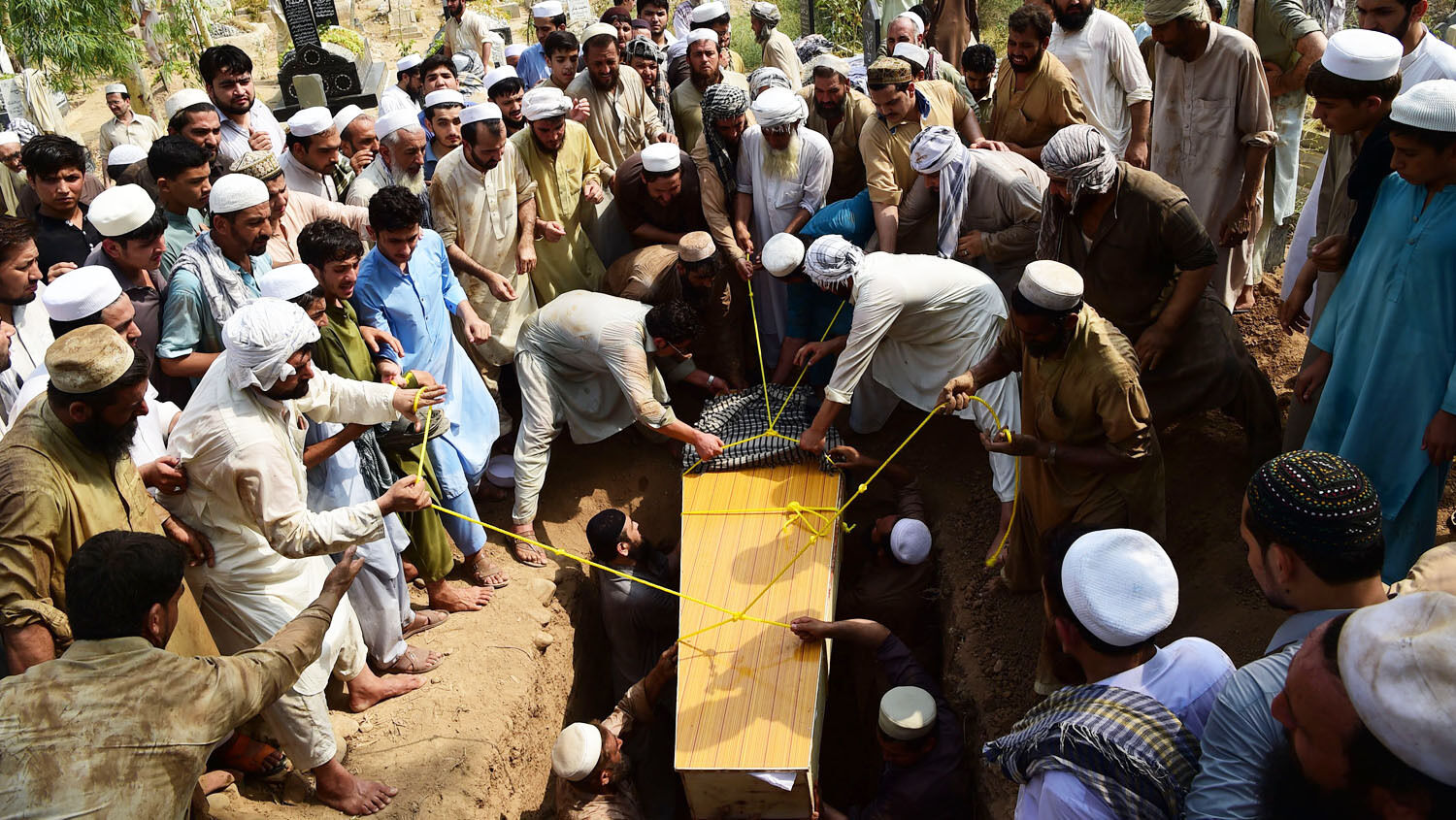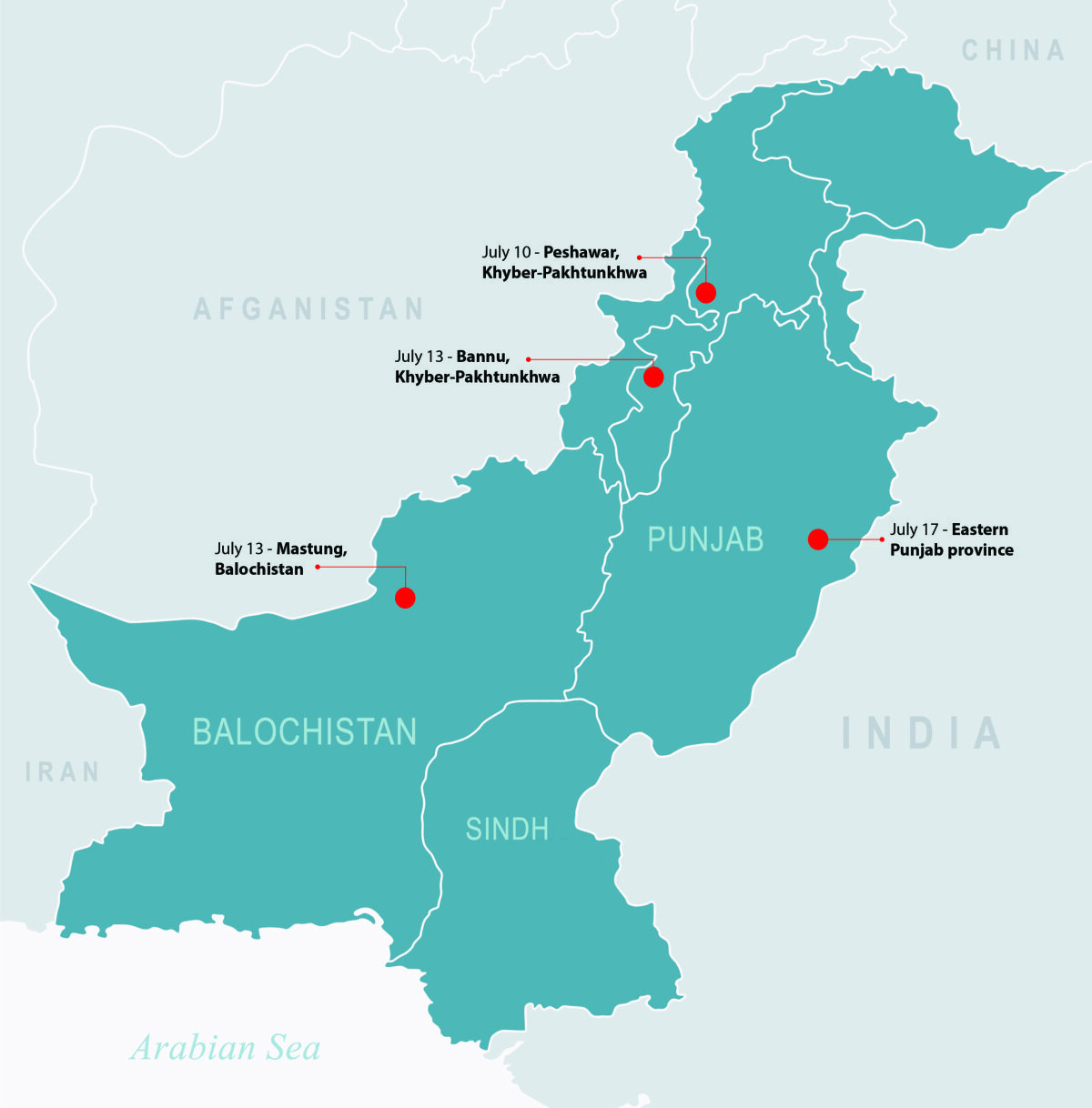
Terrorist Attacks Threaten Pakistan’s Elections
At least 149 people died and more than 180 were injured in Pakistan on July 13 in a politically motivated suicide bombing. The bombing occurred during an election rally for Nawabzada Siraj Raisani, a candidate for the country’s legislature. Raisani had just begun to speak to the crowd when the bomb exploded; he was among those who were killed.
That same day, four people died and at least 32 were injured in a roadside terrorist attack on the convoy of Akram Khan Durrani, another political leader. Durrani escaped unhurt. Three days earlier, candidate Haroon Bilour and at least 20 other people were killed in a suicide bombing in Peshawar. Pakistani police reported another attempted attack on a former government official on July 17, but that official escaped unharmed. The Pakistani branch of the Taliban and the Islamic State have claimed responsibility for the attacks.

The Pakistani general election is scheduled for July 25. Human Rights Watch has warned that if the terrorist attacks continue, the democratic process in Pakistan could be in jeopardy. A spokesman for the organization said, “The upcoming elections could be severely compromised unless the government and security forces take immediate measures to ensure that all parties can campaign freely, without fear.”
Pakistan’s National Counter Terrorism Authority announced on July 10 that terrorists may have plans to attack at least five more political leaders and two political parties before the election. Police have now started taking steps to prevent further violence. For Raisani, Bilour and hundreds of others, however, it’s too late.
“[T]he damage is already done,” wrote trt World, a Turkish news source. “The terrorists’ tactic of cherry-picking leadership figures of different parties has prompted party chiefs to curtail their campaigns in the country’s vulnerable western half, amid (legitimate) wailing about a glaring lapse by the national security apparatus.”
The death toll of the July 13 bombing almost matches Pakistan’s most deadly terrorist attack. In that December 2014 attack, the Pakistani Taliban targeted an army-run school and killed more than 150 people, including more than 130 children. That tragedy rocked the Pakistani people and led to calls for the military to take action against militant jihadist groups. Since then, the number of terrorist attack casualties has dropped. Last year, Pakistan had its smallest number of terrorist attack deaths since 2005, according to one source.
But recent events show that terrorist groups are still very active in Pakistan. They regularly interfere in Pakistani politics during the election season, targeting opposing candidates and party members.
Human Rights Watch wrote, “Violence that prevents all Pakistanis from participating [in elections] freely, in safety, risks setting back the country’s democratic progress.”
The Islamic Republic of Pakistan, which was established in 1947, is a parliamentary democracy according to its Constitution. However, the young nation has suffered from political instability. Pakistan’s government has experienced several military coups. Terrorism has had a significant effect on politics, the military has initiated several coups, and military leaders essentially control the government.
On July 6, 2017, former Pakistani Prime Minister Nawaz Sharif was sentenced in abstentia to 10 years in jail on corruption charges. During his third non-consecutive term as prime minister, Sharif had crossed the line by trying to limit the army’s influence on the government. Last July, Pakistan’s Supreme Court disqualified him from serving in public office on the grounds of corruption.
On July 13 this year, Sharif flew back to Pakistan from London, where he had been visiting his wife, who is ill. He and his daughter Maryam, who also faces charges, were arrested when they entered Pakistani airspace. Some Pakistanis think that Sharif is being unfairly charged in a “judicial coup” to keep him from running for office.
The Financial Times has termed the 2018 election campaign the “dirtiest election in years” in Pakistan. Candidates claim that the Pakistani military has increased its interference in the election, threatening to instigate more corruption cases like Sharif’s. Some sources have even questioned whether the July 13 bombing was an attempt to distract attention away from Sharif’s arrest on the same day, saying that the government may have had intelligence that the bombing was planned but not acted on it. Between the military and the terrorists, this election has quickly descended into the same violence that has characterized Pakistani politics for decades.
Some Pakistanis accuse the army of not providing enough protection to candidates and security at election rallies, even though it knows that they are targets. The military plans to deploy 370,000 soldiers on election day to patrol the streets and secure all polling stations. However, this has raised concerns that government forces could easily tamper with vote counting.
Pakistan has always been a volatile country. If this election is successful, it will only be the second time in Pakistan’s history that the government has transitioned from one civilian government to another without a military coup. But the recent terrorist attacks are threatening a peaceful transition.
Pakistan is a nuclear-armed state. The International Campaign to Abolish Nuclear Weapons estimates that Pakistan has 120 to 130 nuclear warheads. An increase in terrorism in this unstable nuclear state is dangerous, and not just for Pakistan.
Trumpet writer Jeremiah Jacques wrote in a 2014 article, “How Stable Is Nuclear-Armed Pakistan?”:
Pakistan’s military, which is mostly pro-Western, controls its 100-plus nuclear weapons. But a collapse of the government could mean an uncertain future for the arms. It is possible that they could even fall under the control of some of Pakistan’s many Islamic extremists or terrorists groups. A United States government analysis, quoted by nbc News in 2011, called Pakistan “the least stable of the nine nuclear weapons states and the one where there has been significant support for Osama bin Laden and al Qaeda, not only among the general population but also within the military and intelligence forces.”
It is telling that Bin Laden was able to live, undisturbed, just a few hundred yards away from a prestigious Pakistani military academy for nearly a decade.
The instability of Pakistan’s nuclear weapons was perhaps most evident in 2007 and 2008, when homegrown terrorists attacked its nuclear sites at least three times. In November 2007, terrorists struck the nuclear missile storage facility at Sargodha. That December, a suicide bomber attacked Pakistan’s nuclear airbase at Kamra. The following August, Pakistani Taliban suicide bombers raided an armament complex at the Wah Cantonment, one of Pakistan’s primary weapons facilities, and managed to blow up several of its entry points.
Even if the current wave of unrest in Pakistan blows over, the potential for turmoil in the nuclear nation remains high.
Islamic terrorism is again threatening the stability of Pakistan, an already unstable nuclear state, just as it has threatened the stability of so many other areas of the world.
Trumpet editor in chief Gerald Flurry wrote in 2003: “We must stop those powers that nurture terrorism. If we fail, our future is extremely black” (emphasis added). The rise in Islamic terrorism is a serious threat not just for Pakistan, but for the rest of the world. But as Mr. Flurry continued in that article, “[T]his is all leading directly to the return of Jesus Christ. That is the best possible news this world could ever hear! This evil world of terrorism and war is about to end forever.”
If you would like to read more about the severity of the terrorist threat and how it is prophesied to lead to greater global instability, read Mr. Flurry’s article “Why We Cannot Win the War Against Terrorism.”
